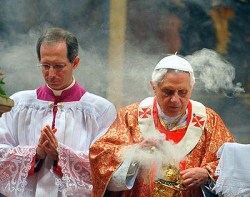

|
|
| Musical Musings: Liturgy |
|
|
Papal Liturgies
The Holy Father is the Supreme Liturgist in the Church. It is he who promulgates the liturgical books, like the Missale Romanum. Notice how the various versions of this book bear the names of the pontiff who promulgated them:
Most of the details of these editions are handled by the Vatican Congregation for Divine Worship and the Discipline of the Sacraments, but ultimately the pope has the authority to regulate the Church's liturgy. Note that in the new 3rd edition of the Missale Romanum, Pope Benedict personally handled some issues. For example, by his own order the translation of "pro multis" will now be rendered "for many" rather than "for all." There will be new dismissal texts for the deacon, penned by the pontiff himself. If indeed the pope has the final say in matters liturgical, shouldn't we be looking to him for guidance in the way we are to celebrate Mass ourselves? With EWTN and other Catholic television, with YouTube and Pope2you websites, it is quite easy to view ceremonies from the Vatican. Next time you see a papal Mass, watch with an eye toward how things are done. What can be learned about improving our own liturgies by watching the Supreme Liturgist celebrate Mass? In charge of ordering the papal Masses is Monsignor Guido Marini, Master of Pontifical Liturgical Celebrations. An article in the Washington Post by Jason Horowitz in Rome discussed Marini, "the new assistant [who] facilitates the formal liturgical style of Pope Benedict." "The criterion is that it be beautiful," Marini said about the liturgy. According to the author, "Some of the key trappings of the Mass have taken on a more ancient air since Benedict succeeded John Paul II, and since Guido Marini (45) succeeded Piero Marini (68)." The younger Marini (no relation to the elder) is more "punctilious," and "has argued for more traditional liturgical symbols and gestures — like the pope's preference that the faithful kneel to receive communion." Since the Marini II era began in October 2007, the papal Masses clearly have a stronger traditional element. Marini argued that the changes should not be seen as a liturgical backlash to modernity, but as a "harmonious development" in a "continuum" that takes full advantage of the Church's rich history and is not subject to what he has called "sporadic modifications." And here is what is now called the Benedictine altar arrangement: At most papal Masses, a large crucifix flanked by tall candles is now displayed on the altar, even though many progressives say the ornaments block the view of the priest and the bread and wine. How telling that the "progressives" call the crucifix and altar candles "ornaments" and worry about the priest being seen, as well as the "bread and wine." Marini's response: "The crucifix reminds the faithful of who is really front and center in the Mass." One would hope that the days of the "pop-star celebrant" are waning. And efforts are being made to reaffirm the importance of Gregorian chant and Latin in our liturgy. For Marini, Gregorian chant must be the music of the Church because it best interprets the liturgy. And in September 2010, ahead of the pope's visit to Britain, Marini said that the pope would pray all the Prefaces and Canons of his Masses in Latin. The liturgical styles of this and the preceding pontificate are different in some respects. Regarding the previous one, Marini notes, "It's true that there were celebrations that gave more space to different expressions, but that was one style and now there is a differnet style, one that is more sober and more attentive to the essential things." He adds that "Pope Benedict considers the Mass a heavenly space that shouldn't be modified with 'things that don't belong.'" Pope Benedict leads by example and teaching, rather than by edict. "Marini has said that there are no plans to force the changes on parishes around the world, but he hopes that they slowly spread and seep in." Watch ... and learn! |
